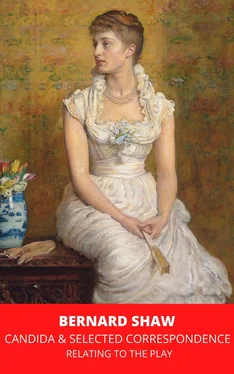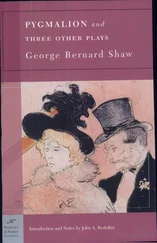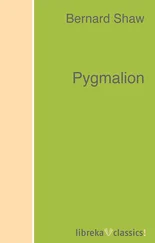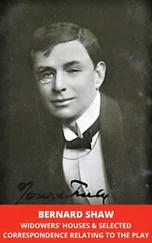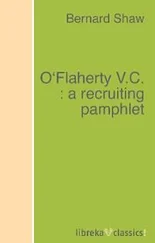1 ...7 8 9 11 12 13 ...23 I cannot lock up the brandy—but I can poison it. You must stop now: the change in your appearance shews that you are just at the point where that accursed stimulating diet must be dropped at all hazards. All through your illness you were beautiful and young; now you are beginning to look, not nourished but—steel yourself for another savage word—bloated. Do, for heaven’s sake, go back to the innocent diet of the invalid—porridge made of “miller’s pride” oatmeal and boiled all night into oatmeal jelly, rice, tomatoes, macaroni, without milk or eggs or other “nourishing” producers of indigestion. You can’t drink brandy with wholesome food; and if you take exercise you won’t want so much morphia. Eat stewed fruit and hovis. If you have any difficulty in digesting walnuts (for instance) nibble a grain of ginger glace with them and chew them and you will have no trouble. You will eventually strike out a decent diet for yourself. Anyhow, save your soul and body alive, and don’t turn me into granite.
GBS
25/ Bernard Shaw’s diary
Preliminary Notes 1895
Still living at 29 Fitzroy Square.
I began the year by taking the post of dramatic critic to The Saturday Review, under the editorship of Frank Harris. This was the first regular appointment I ever held as a critic of the theatres. Salary £6 [£806.79 in 2020 according to Bank of England’s inflation calculator] a week.
During my stay with the Webbs [Sidney Webb and Beatrice Webb née Potter] at the Argoed in August and September I wrote a play in one act about Napoleon entitled The Man of Destiny . At the end of December I began another play title as yet unknown to me [ You Never Can Tell ]. During the Easter holidays with the Webbs, [Charles] Trevelyan, etc, at Beachy Head. I learnt to ride the bicycle and got much more exercise during the year than usual, with advantage to my health so far. I kept up the habit of going to the Webbs for lunch every Sunday.
It was agreed between myself and Richard Mansfield that he should produce my play Candida in New York; and he actually engaged Janet Achurch for the part. She went out; but Mansfield then changed his mind; No I withdrew the play.
In November Janet, when playing The New Magdalen [by William Wilkie Collins] for the week at the Metropole Theatre in Camberwell, caught typhoid fever, and her illness occupied me a good deal during the last two months of the year, partly because of its bearing on all possible plans for the production of Candida , and partly because I have come into relations of intimate friendship with the Charringtons [Charles Charrington and his wife Janet Achurch] during the past two years or so.
Frank Harris tried to establish a regular lunch every Monday for choosing members of the Saturday Review staff at the Café Royale. I attended them for some time. Harold Frederic, Mrs Devereux [Pember], Marriott Watson and others used to come. Oscar Wilde came once, immediately before the Queensberry trial, with young [Alfred] Douglas. They left in some indignation because Harris refused to appear as a witness—a literary expert witness—to the high artistic character of Wilde’s book Dorian Gray . These lunches wasted my time and were rather apt to degenerate into bawdy talk. When a play called The Home Secretary [by Richard Claude Carton] was produced at the Criterion Theatre, I took the opportunity to protest against the attempt in the play to trade on the Anarchism bogey, my object being to call attention to some hard features in the case of Charles [Fred Charles Slaughter], “the Walsall Anarchist.” Harris alarmed by this, cut the passage out of the article. This incident brought my growing impatience with the brag and bawdry of the lunches to a head; and I never went again. They seem to have fallen through afterwards.
26/ To Charles Charrington
16th March 1896
Dear Charrington
Before you go committing yourself to Morell, I want to put before you the case on the other side—the case which has always prevented me from looking to you for Morell as I look to Janet for Candida.
Imprimis, you are only attracted by the universal human element in the man, and not by his specific individuality. That’s very dangerous to begin with; and I am by no means sure that you would not overcome the obvious misfit of Eugene’s age and build more successfully than that of Morell’s character & temperament.
Morell is a very glib, sanguine, cocksure, popular sort of man. His utter want of shyness; his readiness to boss people spiritually; his certainty that his own ideas, being the right ideas, must be good for them: all this belongs to the vulgarity which makes him laugh at Eugene’s revelation, and talk of “calf love.” It is nothing to the point that he is also goodnatured, frank, sympathetic, and capable of admitting Candida’s position finally when it is presented to his feeling , in spite of the fact that he would have disputed it hotly had it been presented to him as a purely intellectual position. That rescues him from the odium which would otherwise attach to him as, intellectually and normally, a clerical bounder; but it does not assimilate him in any way to the parts which lie nearest to you. I can see you well enough in the heartstricken passages; but I do not see you facile, cheery, spontaneous, fluent, emphatic, unhesitating and bumptious in the early scenes with Prossy & Burgess & Eugene (before the explosion) in which the whole specific part of his individuality has to be fixed; I don’t hear your boisterous cheery laugh, which should not be refined out of the part merely because I have to refine it out myself in reading the play from sheer incapacity to get quite into that coarse part of his skin; I don’t see Candida carrying conviction when she tells you that you are the idol of a Victoria Park congregation, the contrast in everything to the hunted Eugene; I don’t see you as the spoiled child, the superficial optimist, the man who, in spite of his power of carrying everything before him by the mere rush and light & warmth of his goodnature & conviction, is stopped by the least resistance.
Granted that all this could be got over by sheer acting, is there the smallest likelihood of your making such an arduous and unnatural effort as the feat would require? And suppose you failed—suppose your Morellism carried no conviction to the audience—have you considered how complicatedly damning the failure would be both to yourself and Janet? If you stood quite alone, the effect of a return to the stage with the particular sort of failure—the failure that spoils a play sympathetic enough to make the audience angrily resent its being spoiled—would be bad enough from your own point of view as an individual unattached actor. But there is something worse to be apprehended. If people get the idea that they can’t have Janet without also having you thrust into a part for which you are unsuited, it will be all up with Janet and with you. And that is just what I am afraid of. . . The question, therefore, is not whether you can get through Morell passably by putting in a few stomach tones, and (by indulging in genuine emotion) making yourself diabolically ugly at the moment when Candida is telling you that the women cannot look at you without adoration, but whether you could play him with such absolute conviction, fitness, and spontaneity that all question as to the propriety of your casting yourself for the part would fall to the ground without a word.
My own opinion on the point has already been completely betrayed to you by the fact that I have never treated the part as your property, in spite of the very discouraging quality of the practicable alternatives to you. Take any of those alternatives—[Herbert] Waring or anyone else—let us call him XYZ. XYZ will not exactly fail: he will only underplay; and all the papers will treat him with great politeness. You will either fail or succeed; and if you fail, the result will be damnation. XYZ’s underplaying will not hurt Janet: it will have absolutely no reactions of any importance. Your failure, if you fail, will have the most disastrous reactions in all directions, on her, on the I.T. [Independent Theatre], on me, on yourself as a manager as apart from an actor, and devil knows what else besides. Consequently you present yourself, as compared with XYZ, as a frightfully risky Morell at a point in our game where we cannot afford to throw away a single chance. Now what probability is there of your being as transcendently better a Morell, if you succeed, than XYZ, as to justify you in casting yourself for it at such odds? Hast thou these things well considered? . . .
Читать дальше
